BLKS is gonna be a blockbuster. Let’s get that out of the way. BLKS is a rapid-fire, laugh-out-loud comedy about a quartet of twenty-something black women in New York City who are roommates, gal pals, and lovers. The script is chiseled by Aziza Barnes in edgy/sexy wit and warmth that will bust your gut and break your heart. The performances and production values are over-the-top outstanding. The buzzy opening night audience went insane. But here’s the really amazing part: The hilarity is revolutionary.
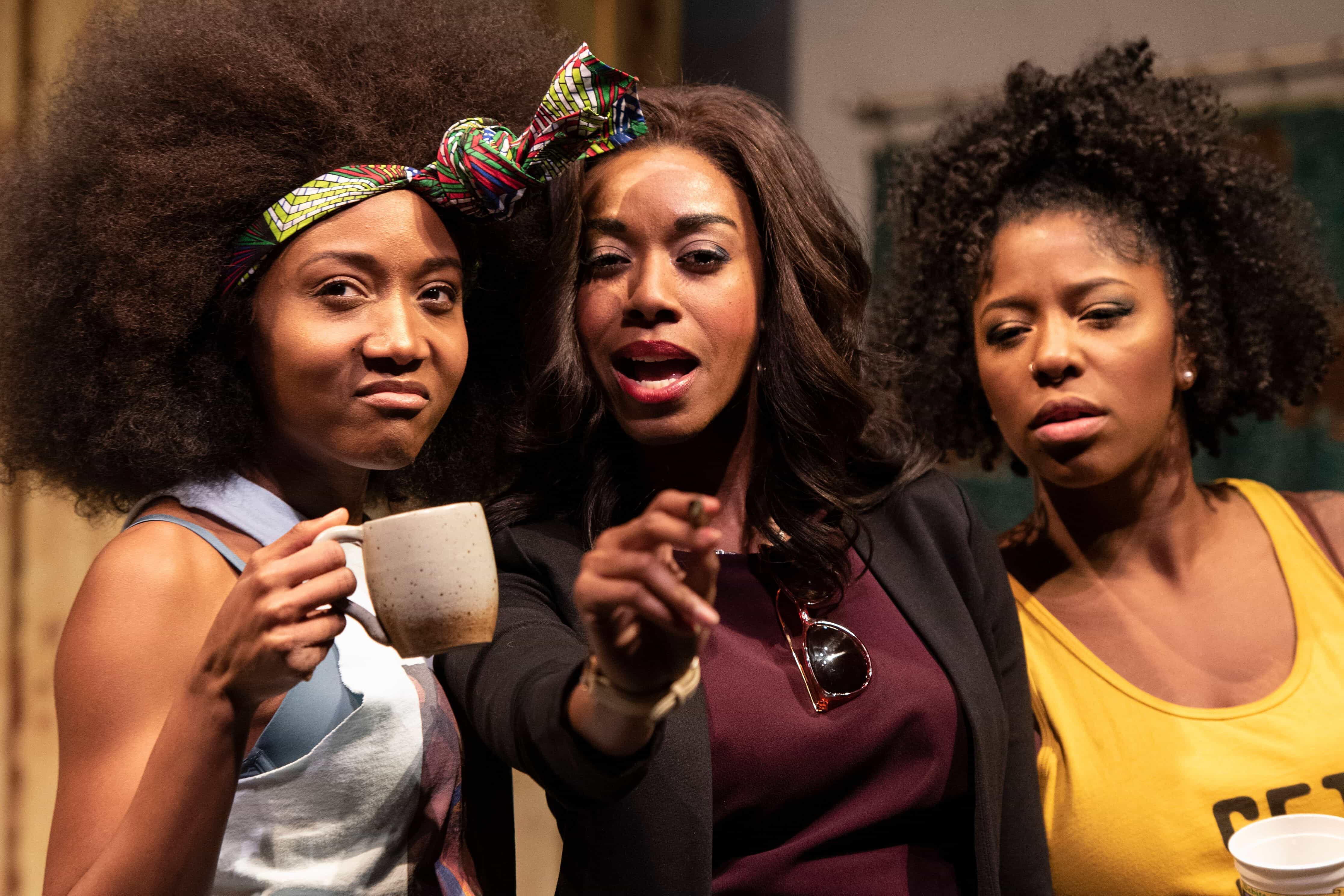
We’ve seen plenty of clever rom-coms and sit-coms about mostly white twentysomethings, mostly straight, trying to get their shit together so they can find love and get a life. Think Friends, Girls, The Big Bang Theory, Broad City—shows that function exactly like white noise because they can block out obtrusive sounds of reality (if you’re in the demographic) or put you to sleep (if you’re not).
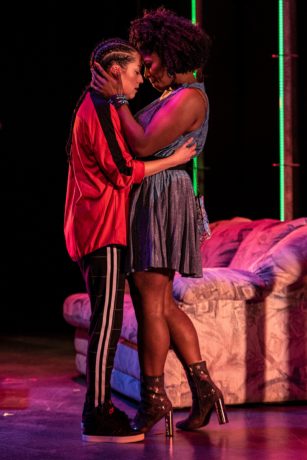
BLKS is not just a rejoinder; BLKS is in a league of its own. BLKS is about being black and female and written by someone who writes funny and actually knows what they’re talking about (how often does that happen on stage?). Plus it’s as raw, blunt, and brazen as it fuckin wants to be. So be advised: If you’d rather not see a show that opens with a scene of cunnilingus—two women, Octavia and Ry, moaning and growling in orgasmic ecstacy—you might want to see what else is on.
Or if you were rattled by the reiterated word pussy in Jen Silverman’s Collective Rage (Woolly’s previous funny foray into all-female terrain), be aware that this time it’s clit. The anatomic specificity is significant because it’s the site—in the very next scene—where Octavia is shocked to discover she has a mole.
That’s the play’s inciting action. A blemish on a clitoris. And from then on all hullaballoo breaks loose.
The poet Aziza Barnes (whose pronoun is Z) wrote BLKS in a playwrighting class when Z was at NYU. “I didn’t want it to be poetry,” Z says,
because I wanted this play to be centered on the way in which Black women or genderqueer Black women who are close with each other, speak to one another.
I could argue that for the six indelibly drawn characters in BLKS, the idiom of the play is poetry—the poetry of the crib, the street, the club, the bed, the heart.
BLKS takes place over the course of twenty-four hours and much of it happens in the drab apartment shared by Octavia, June, and Imani, who each are trying to make it and make something of themselves. Octavia (Cyndii Johnson) is collaborating with her lover, Ry (Alina Collins Maldonado), on an artsy film; Imani (Shannon Dorsey) aspires to be a stand-up comic à la Eddie Murphy; June (Tatiana Williams) is a very employable math whiz. Booze and joints are their drugs of choice. They get along tumultuously.
When Octavia freaks out about her mole, Imani offers to make a first-aid run to CVS. Octavia then freaks out even more because Ry, the woman who was just giving her head, won’t look at it, so Octavia kicks her out. Imani returns with a bagful of Band-Aids, and hysterical hysteria ensues. Meanwhile, June comes home having learned that her boyfriend has been cheating on her: She went to his place to make him pancakes and found empty Popeyes boxes on the kitchen table along with a used condom. So June is freaking out too.
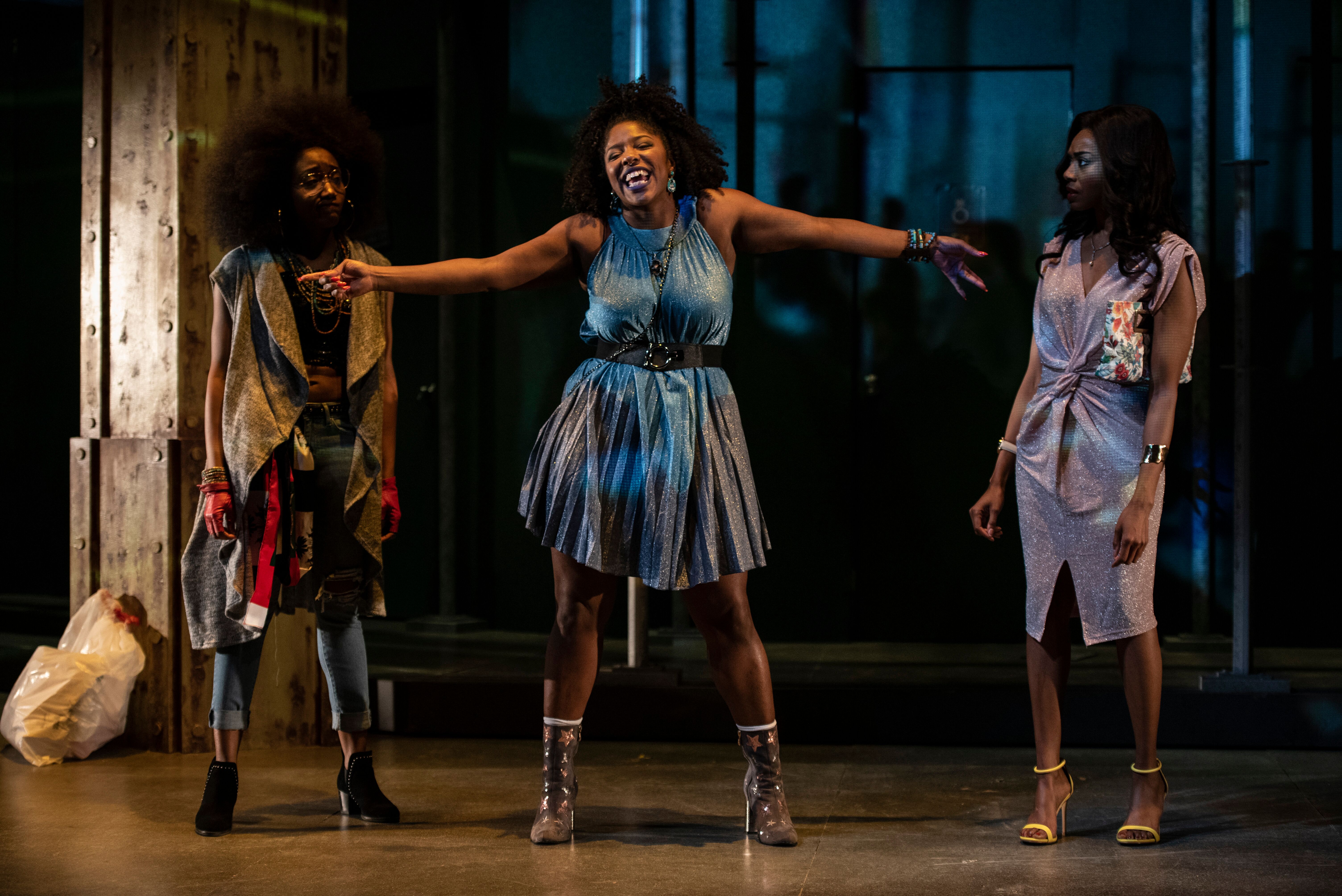
The story takes a sobering turn as the scene shifts to a city street where the roommates encounter a thuggish young black man (Justin Weaks) roughing up a drunk young white woman (Madelyn Joey Rose). They call 911 for help but are told by a racist operator all cop cars have been dispatched.
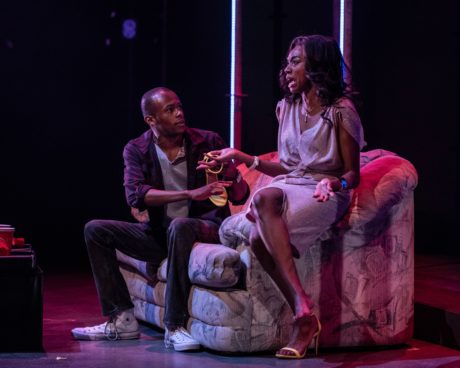
Weaks will return later, utterly transformed, playing an earnestly nice young man named Justin, who is smitten with June but in comic-mixup circumstances is invited to lickety-split by Octavia. Rose also reappears in a different guise, as a wannabe-woke white girl called The Bitch on the Couch, in a maybe/maybe-not hookup with Imani.
The characters’ interconnections get more startling, the mood pendulums between hilarious and heavy; the cast’s acting becomes ever more exhilarating to behold. The entire ensemble is of Helen Hayes-award caliber, but an extra shoutout goes to Shannon Dorsey and Justin Weaks, whose gifts for physical comedy just keep on giving. To watch Dorsey bounce giddily about, and Weaks clamber gangly through a window, is to savor two of DC’s preeminent talents in peak comedic form.
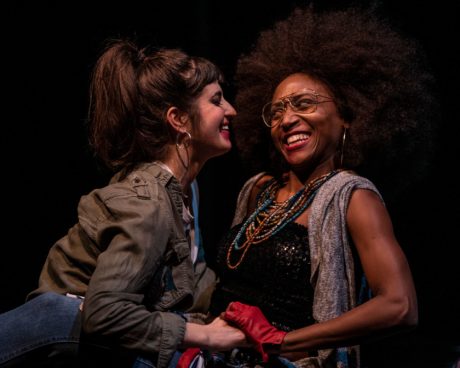
Director Nataki Garrett directed a previous production of BLKS in Chicago, and her intimate grasp of the play’s quirky characters, catchy rhythms, and underlying poignance is evident in every riveting beat. Among the play’s touching moments is the scene when June explains why every time her boyfriend betrays her, she puts on the gown from the cotillion he once took her to. Another is when Imani shares why she and her father watched Murphy’s Raw on DVD while her dad was dying. Never far from the surges of laughter are young lives urgent to mean and connect.
Overhead are enormous girders on which are projected the passing undercarriage of elevated subway trains accompanied by their rolling-thunder rumble. Between scenes colorful projections saturate the set with stunning views of Manhattan in motion. The cinematic scenic effects and whirlwind scene changes are among the best I’ve ever seen. Props for that to Scenic Designer Efren Delgadillo Jr, Lighting Designer Jeanette Oi-suk Yew, Sound Designer T. Carlis Roberts, and Projections Designer Rasean Davonte Johnson.
Costume Designer Lex Liang has dressed the characters as though in backstories, and Wig and Hair Designer Jason Hayes has styled them as if accessorizing their personalities. Intimacy and Fight Choreographer Lorraine Ressegger-Slone had her work cut out for her—what with all the brawling, lip-locking, and getting it on—and she worked it.
In Barnes’s words, BLKS is “a play by and for Black people”—which by now ought to be less revolutionary, and more customary, than it still is. Too often we see works on stage that are about black people but really for white people—productions often very artful yet basically cultural artifacts in the comfort zone that commercial American theater affords everyone except people of color. BLKS is different. “If you are not identifiable or identified as a Black person, you cannot claim it as yours, and you can’t commodify it as yours,” Z explains. “But you can surely enjoy it. And you can surely experience it.”
Z is absolutely right about that. And tickets are gonna go fast.
Running Time: About two hours, with no intermission.
BLKS plays through March 3, 2019, at Woolly Mammoth Theatre Company – 641 D Street NW, Washington, DC. Purchase tickets at the box office or order online.




